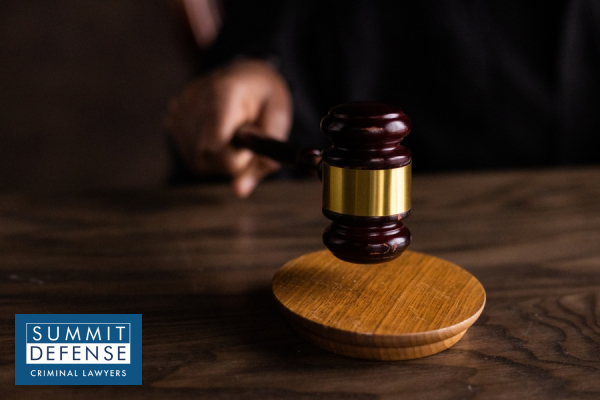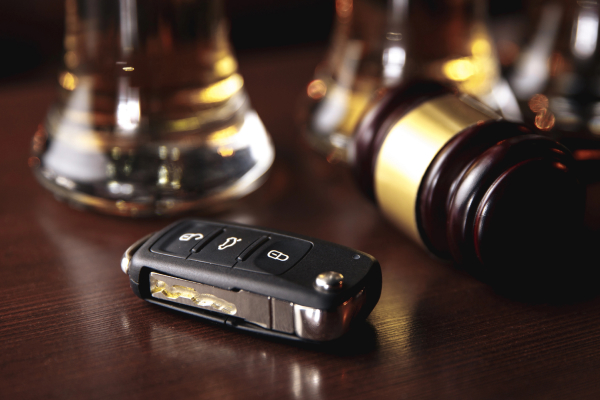Understanding What You’re Up Against
After a DUI arrest, you enter a system that moves quickly and has serious rules. Even one wrong move can lead to long-term problems. Before making decisions, it’s best to know what you're facing. Every step matters, and it helps to clearly understand the process before trying to defend yourself.
What Happens After a DUI Arrest
Once you’re arrested for DUI, you'll likely be taken to the police station for a breath or blood test. The officer may also have given you field sobriety tests on the side of the road. After testing, you’ll either be released with a court date or held in custody.
This begins both the criminal process and a DMV review that can lead to license suspension. The steps are fast and confusing, especially if you don’t understand the legal system.
Criminal Charges vs. DMV Penalties
Your DUI triggers two different processes. First is the criminal case, where a judge decides if you're guilty and what sentence you’ll face. Second is the DMV process, which deals with your driver’s license.
You can lose your license even if you haven’t been convicted yet. Both parts have different rules, and both can carry legal consequences. Handling both without help from a DUI attorney can lead to missed deadlines or penalties you didn’t expect.
The Legal Risks of Representing Yourself
If you decide to fight a DUI alone, you take on serious legal risks. You’ll be expected to understand court rules, laws, and how to respond to the prosecution’s evidence. One mistake could lead to a DUI conviction or harsher punishment than necessary.
Judges will not offer legal advice, and prosecutors are not on your side. Without an experienced attorney, it’s easy to say the wrong thing or miss a key defense strategy that could have helped your case.
Is It Legal to Fight a DUI Without a Lawyer?
 Yes, you are allowed to represent yourself in a DUI case. But just because you can, doesn’t always mean you should. The legal process is more complicated than many people expect, especially with the serious penalties involved in DUI charges. Before choosing to go alone, always know your rights and what might happen next.
Yes, you are allowed to represent yourself in a DUI case. But just because you can, doesn’t always mean you should. The legal process is more complicated than many people expect, especially with the serious penalties involved in DUI charges. Before choosing to go alone, always know your rights and what might happen next.
Your Right to Self-Representation
In California and across the country, you have the right to defend yourself in court, even in a DUI case. This is called “pro se” representation, and the court must allow it if you ask. However, the judge will also make sure you understand the risks before allowing it.
Once you waive your right to legal counsel, you’re held to the same standards as a trained attorney. That means you must follow rules, file the right motions, and handle court procedures on your own.
When the Court May Appoint a Public Defender
If you can’t afford a DUI attorney, and the court finds that you qualify as low income, it may assign you a public defender. These are licensed lawyers paid by the government to represent people who don’t have the means to hire private criminal defense attorneys.
While many public defenders work hard and care about their clients, they are often handling many cases at once. That can make it harder for them to give your case the attention it truly needs.
Limitations of Going Pro Se (Representing Yourself)
Trying to represent yourself in a DUI case can lead to many problems. You won’t have the same training or tools that a DUI attorney would use to build a solid defense strategy. Understanding sobriety tests, reviewing blood test procedures, or challenging field sobriety test errors takes experience.
You also may not know how to argue against the prosecution’s case, cross-examine a police officer, or use laws in your favor. Without legal representation, you risk making mistakes that could lead to a DUI conviction or much harsher penalties than necessary.
Challenges of Defending Yourself
Defending yourself in a DUI case may seem possible at first, but it quickly becomes overwhelming once you’re deep into the court process. Without legal training, it’s easy to miss important steps or say the wrong thing.
Each part of your case, from court filings to interactions with officers, can affect the outcome in serious ways.
Understanding Complex DUI Laws
DUI laws involve more than just whether you were drinking and driving. You need to understand how chemical tests, blood alcohol concentration rules, and field sobriety tests work under state law. You must also know how to challenge test results, understand what’s admissible in court, and when to argue that the police lacked probable cause.
These laws can be confusing even for those with experience. Without a thorough grasp of how the legal system handles drunk driving cases, you may overlook key defenses or weaken your position before trial even begins.
Filing Motions and Meeting Deadlines
A big part of any DUI case includes filing motions at the right time and responding to the court by specific deadlines. These motions can include requests to suppress evidence or dismiss charges based on improper police actions or chemical test errors.
Courts are strict about timing, and if you file late or incorrectly, the judge may deny your request, even if it was valid. Missing deadlines, submitting the wrong form, or failing to follow court procedures can hurt your case before you even get the chance to speak.
Cross-Examining Police Officers in Court
During the trial, one of your biggest challenges will be questioning the police officer who arrested you. A trained lawyer knows how to ask sharp questions, challenge the officer’s memory, and expose weak parts of the prosecution's case.
If you represent yourself, you’ll be expected to do the same, even without legal experience. Cross-examining a witness, especially someone in uniform, can be intimidating. Without knowing the rules of evidence or how to create reasonable doubt, you may struggle to challenge the officer’s testimony or protect your rights.
Gathering and Presenting Evidence Effectively
You might have a strong defense, but if you can’t gather the right evidence and present it the right way, the court may never hear it. You’ll need to request blood test records, review video footage, and possibly bring in expert witnesses, all while following court rules. You also must make sure your evidence meets legal standards, or it may be rejected.
A DUI attorney knows how to build a strong case through records, witness testimony, and legal arguments. On your own, it's harder to prove your side without the same training or courtroom experience.
Situations Where Self-Representation Might Work
 While defending yourself in a DUI case is often risky, there are some situations where it could be less harmful. In very simple cases with no added legal issues, representing yourself might save time or money. But even then, you must fully understand the risks before making that choice.
While defending yourself in a DUI case is often risky, there are some situations where it could be less harmful. In very simple cases with no added legal issues, representing yourself might save time or money. But even then, you must fully understand the risks before making that choice.
First-Time Offense With No Aggravating Factors
If this is your first DUI and there were no accidents, injuries, or refusal to take chemical tests, the case may be more straightforward. Some courts offer leniency for first-time offenders, especially when there’s no reckless driving, very high blood alcohol concentration, or poor field sobriety tests.
You might be offered a standard sentence, such as DUI school and fines. Still, even in these situations, it's wise to consult a DUI attorney first. A quick legal consultation could help you understand if you're making a smart decision or walking into something more serious than it looks.
Clear Technical Error or Violation of Rights
In some cases, the arrest might have clear problems, like a police officer stopping you without probable cause, failing to read your rights, or using a broken breath test machine. If it’s obvious that your rights were violated or the chemical test was flawed, and you understand how to point that out, you might be able to raise those issues on your own.
However, even with a strong argument, knowing how to file motions and argue lawfully takes skill. A mistake in how you present these facts could cause the court to reject your defense entirely.
You Only Want to Negotiate a Plea Deal
If you’re not trying to beat a DUI, and all you want is to accept a sentence and move on, then self-representation might work. For example, some people just want to plead guilty, pay the fine, go to DUI school, and avoid more hearings.
In these cases, the court may allow you to speak for yourself and move forward quickly. Still, even with a plea bargain, you should understand what rights you're giving up and whether a lawyer could’ve helped you get a better outcome. Once you enter that plea, it’s usually hard to take it back.
Public Defender vs. Private DUI Lawyer
When facing a DUI, one of the biggest decisions you’ll make is choosing who will defend you. If you qualify, the court may assign a public defender at no cost. But many people choose to hire a private DUI attorney instead.
Each option has its benefits and drawbacks. What’s best for you depends on your case, your budget, and how much time and attention your defense may require. Before making a decision, it’s important to weigh the differences in time, experience, and access to resources that each type of lawyer may offer.
When It Makes Sense to Hire a Private Attorney
If your DUI case is more complex, includes prior convictions, or involves unusual chemical test results, hiring a private DUI attorney is often the better choice. A private lawyer usually has more time to focus on your case and can give you direct, personalized attention throughout the process.
They can dig deeper into the prosecution’s evidence, meet with expert witnesses, and craft a stronger, more focused strategy. When your job, freedom, or record is on the line, investing in a skilled lawyer can make a real difference in the outcome.
Cost vs. Risk: What’s at Stake?
Hiring a private lawyer does cost more, but it’s important to think about what you’re risking. A conviction could lead to license suspension, fines, DUI school, jail time, or even a criminal record that affects your future. You may lose job opportunities, face insurance hikes, and struggle with a damaged reputation.
A public defender may not have time to fight each detail of your case, while a private lawyer can look closely for errors in chemical tests, breath test procedures, or how the sobriety tests were done. What you spend now might save more in the long run.
FAQs
 Getting a DUI can quickly turn your life upside down. From the moment you're pulled over to the time you're in court, everything moves quickly. You might wonder if it's worth hiring a lawyer or if you can handle the case yourself. After all, the penalties are serious. You could lose your driver’s license, pay heavy fines, or even face jail time. The decisions you make early on can affect your record, your freedom, and your future.
Getting a DUI can quickly turn your life upside down. From the moment you're pulled over to the time you're in court, everything moves quickly. You might wonder if it's worth hiring a lawyer or if you can handle the case yourself. After all, the penalties are serious. You could lose your driver’s license, pay heavy fines, or even face jail time. The decisions you make early on can affect your record, your freedom, and your future.

 Yes, you are allowed to represent yourself in a DUI case. But just because you can, doesn’t always mean you should. The legal process is more complicated than many people expect, especially with the serious penalties involved in DUI charges. Before choosing to go alone, always know your rights and what might happen next.
Yes, you are allowed to represent yourself in a DUI case. But just because you can, doesn’t always mean you should. The legal process is more complicated than many people expect, especially with the serious penalties involved in DUI charges. Before choosing to go alone, always know your rights and what might happen next. While defending yourself in a DUI case is often risky, there are some situations where it could be less harmful. In very simple cases with no added legal issues, representing yourself might save time or money. But even then, you must fully understand the risks before making that choice.
While defending yourself in a DUI case is often risky, there are some situations where it could be less harmful. In very simple cases with no added legal issues, representing yourself might save time or money. But even then, you must fully understand the risks before making that choice.
